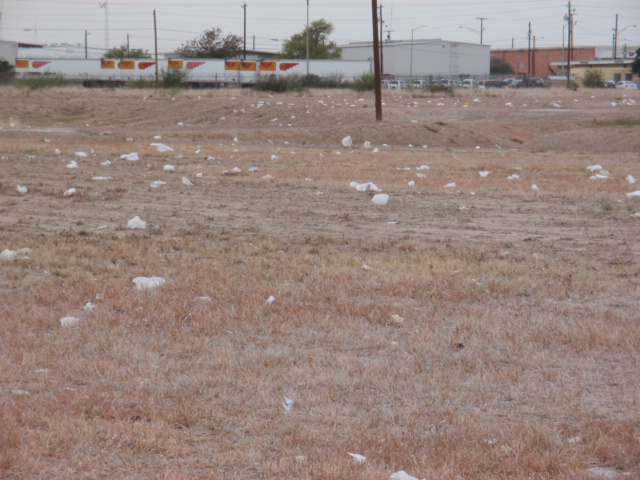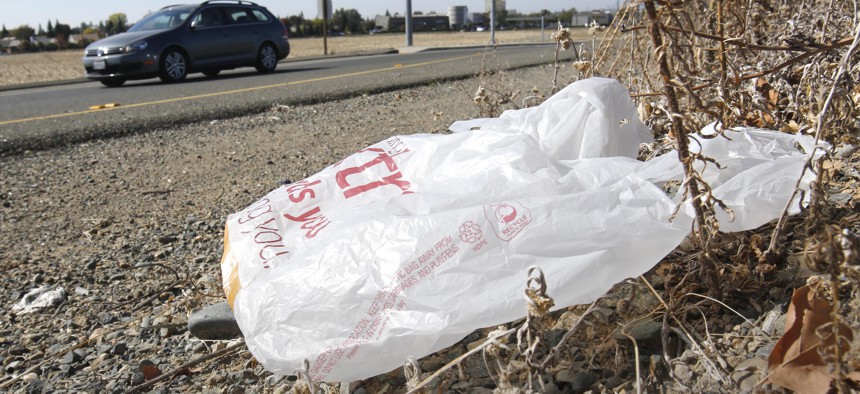Connecting state and local government leaders
The legal fight involved the city of Laredo and marks one of the latest battles over local government power in the Lone Star State.
Local lawmakers don’t have much authority to mess with plastic bags in Texas.
That was the thrust of a state Supreme Court ruling there Friday, which concluded the city of Laredo ran afoul of state law when it banned many local businesses from providing plastic checkout bags to customers. A group of local merchants mounted the court challenge.
It was one of the latest clashes in Texas over state preemption of local government power.
Previous episodes have involved local regulations aimed at hydraulic fracturing, or “fracking,” of oil and gas, as well as so-called “sanctuary city” immigration policies, and state legislation undercutting local authority to regulate app-based ride-booking companies like Uber.
“The roving, roiling debate over local control of public affairs has not, with increased age, lost any of its vigor,” read the court opinion delivered by Chief Justice Nathan L. Hecht.
Texas is one of the main battlegrounds for issues involving local versus state authority, said Alex Jones, manager of the local democracy initiative at the National League of Cities.
"I think there's a big disconnect between the kind of rising power of the bluer cities within Texas and then the statehouses,” he said.
“If there's any state in the country where we would argue that there should be local control to solve local problems, it's Texas,” he added. “You go from the Gulf Coast, to East Texas, to the prairie lands of West Texas. It's clear that they're going to have different priorities."
Laredo Mayor Pete Saenz told Route Fifty Friday that he was disappointed by the court ruling. “But we have to respect it,” he said. “We feel that the fight was worth it."
Saenz said the plastic bag restrictions, which went into effect in 2015, had cut down on the amount of bags gumming up storm drains and clinging to trees, reducing work and expenses for the city.
Plastic waste is notorious for taking decades, even centuries, to degrade. An article published last year in Science Advances estimates that if current trends continue, there will be about 12 billion metric tons of plastic waste in landfills or the natural environment by 2050. This debris is a well documented threat to wildlife, and poses possible health risks to humans as well.
Laredo, a city of about 260,000 residents, is located along Interstate 35, on the U.S. border with Mexico and is one of the nation’s busiest ports of entry.
Even though the city ordinance that contains the bag restrictions has been struck down, Saenz said that he believes that it will have lingering effects on the habits of consumers and businesses, continuing to reduce the amount of plastic bag waste in the city over the long run.
“People have seen the result, they've seen how much cleaner our city is,” he added. “It's a marked difference.”
Laredo’s bag restriction ordinance clearly stated that its purpose was to prevent plastic bag litter. It included exemptions for some plastic bags, like those provided for dry cleaning, take-out food, plants, and bulk items.
The Texas Supreme Court noted in its opinion that it granted the city’s request to review the case in part because other municipalities around the state have enacted similar regulations—it pointed to Eagle Pass, Corpus Christi, Port Aransas, Austin and Brownsville, as examples.
Texas Attorney General Ken Paxton, a Republican, applauded the Supreme Court’s decision.
“I hope that Laredo, Austin, and any other jurisdictions that have enacted illegal bag bans will take note and voluntarily bring their ordinances into compliance with state law,” he said.
“Should they decline to do so, I expect the ruling will be used to invalidate any other illegal bag bans statewide,” Paxton added.
Even for “home rule” jurisdictions in Texas, like Laredo, the state Constitution says that city policies cannot conflict with state law.
And a law on the state’s books, the Texas Solid Waste Disposal Act, says local governments cannot “prohibit or restrict, for solid waste management purposes, the sale or use of a container or package in a manner not authorized by state law.”
The core issue in the Laredo case was whether the city’s bag ordinance conflicted with this state statute and was therefore preempted.
A trial court sided with the city. That decision was later reversed by a divided state court of appeals in 2016. The Supreme Court on Friday upheld the appeals court decision.
“We must take statutes as they are written, and the one before us is written quite clearly. Its limitation on local control encompasses the ordinance,” Hecht’s opinion said.
Some of the legal wrangling in the case centered on whether plastic bags qualify as a “container” or “package” under the Solid Waste Disposal Act. The city argued that they did not.
Laredo’s legal team made other arguments as well.
For instance, that they weren’t regulating the bags for a “solid waste management purpose,” because the restrictions occurred before single-use plastic bags became trash.
But, in the end, the city's case fell short.
“We're happy the court reviewed this case in making it clear that the city of Laredo overstepped its boundaries,” said Christopher Peterson, a lawyer for the merchants.
Peterson says that the bag restrictions were hurting business, particularly for establishments that have customers who come to the city from Mexico and carry away their purchases in plastic bags.
“When they didn’t have bags, they wouldn’t buy anything,” he said.
He also said that the merchants had offered ideas for alternative proposals to control plastic bag waste before the litigation got underway, but that the city ignored them. These, he said, included ideas like bag fees, and proposals that had to do with bag materials.
“Just banning plastic bags is not going to solve our environmental problems here at the border,” the lawyer said.
Peterson suspects that it would be tough now to enact even proposals that the merchants had previously backed because they’d be illegal under the state Supreme Court opinion.
“Because we were forced into this fight,” he said, “the battle to restrict plastic bags will be much more difficult.”

One of the groups that has spearheaded efforts to reduce plastic bag use in Laredo is Rio Grande International Study Center.
“We've been at this for 10 years,” Tricia Cortez, the group’s executive director said on Friday.
At the time the ordinance was passed, the study center estimates that the city was using about 120 million checkout bags per year, with many of them ending up in storm drains, creeks and the Rio Grande river, which provides drinking water for Laredo and other places.
“You still see along the banks of the river years of these bags that have just gotten stuck there and they’re just slowly photo-degrading and they don’t go away,” Cortez said.
But she added that since the now defunct ordinance went into effect, “there’s a very, very noticeable difference in how the city looks.”
The Turtle Island Restoration Network, a conservation organization, warned in court filings that plastic bags can harm sea turtles, which can get tangled with the plastic and also sometimes ingest it. Bags create risks to other animals as well, the group cautioned, including birds.
Cortez called the bag ordinance opponents a “tiny group.” She said that her organization would now turn their attention to getting laws changed at the state level, and working with the city to urge consumers and retailers to continue limiting plastic bag use.
“We just kind of view this as another snag in the process,” she said about the court ruling.
Bill Lucia is a Senior Reporter for Government Executive's Route Fifty and is based in Washington, D.C.

NEXT STORY: FDA builds blockchain-based health data sharing platform




